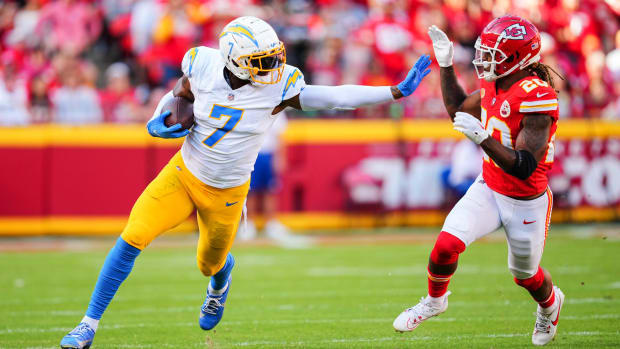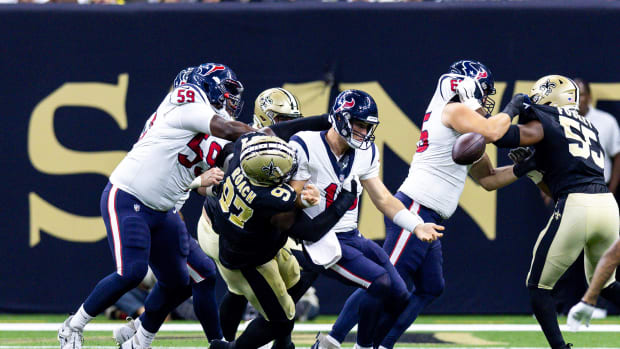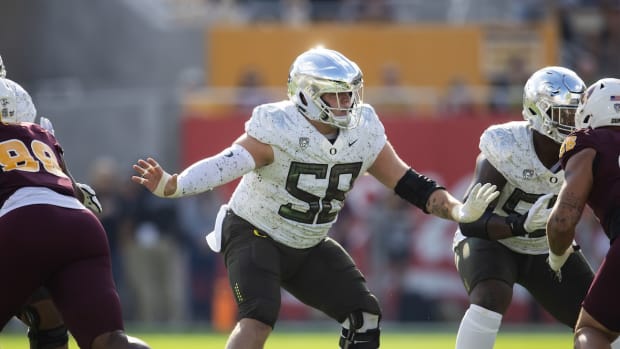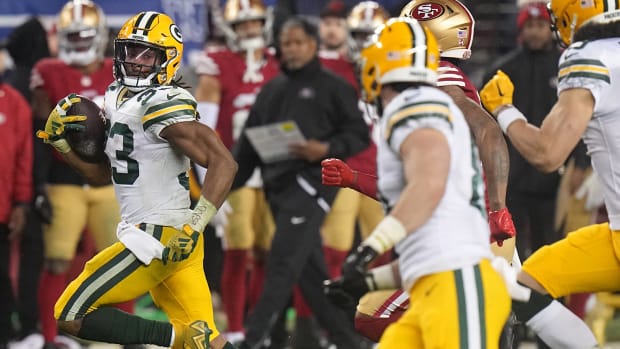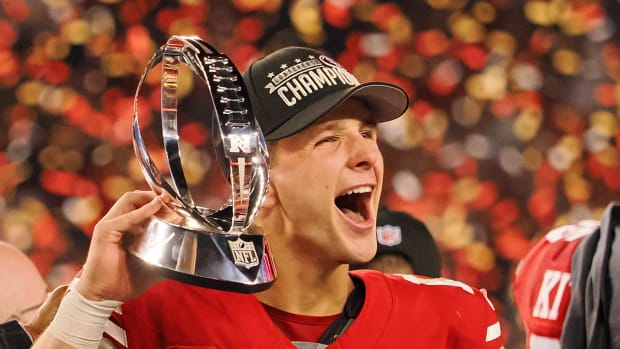‘I’m Under No Illusion That We’re Going to Make Magical Changes’
Eric Winston was elected NFLPA president on Wednesday. (Mark J. Rebilas/USA TODAY Sports)
Former Texans, Chiefs and Cardinals offensive lineman Eric Winston, the newly elected president of the NFLPA, sat down with The MMQB on Wednesday at the Orlando Waldorf, where the union met to elect new leadership, discuss and adopt various resolutions, and educate new player reps about the organization. Having been a strong voice in negotiations for the 2011 CBA, Winston, today a free agent, shared his thoughts on financial literacy, HGH testing and the future of NFLPA executive director DeMaurice Smith, whose term is up in 2015.
ROBERT KLEMKO: How has the NFLPA membership changed since you got involved five years ago?
ERIC WINSTON: It may have gotten younger. I think the league’s gotten a little younger, so you would think the membership is younger. I look at electing a Mark Herzlich to the executive committee. It’s cool because you need to have the young voice; the perspective of a guy who’s just getting off his rookie deal instead of guys who are eight, nine, ten, eleven years in the league. It’s important and we have to make a big push to yank some of these young guys into these rooms. We’ve got to do that in every locker room.
KLEMKO: What’s the most important thing you want to get across to the younger players?
WINSTON: That there’s an urgency of now. I think the status quo won’t do. That’s important to understand. I ran on the idea that the time to complain about the CBA and the negotiations are over. That’s not going to change. Now we have to look for ways to tweak it, to better it, to maximize it. But the reliving part has got to be over. It’s time to look at every aspect of what we have and find ways to get better. We have to continue efforts to advance financial literacy. We fought for an offseason period that would allow guys to go back to college, to take an internship. We’ve got to get to a point where everybody is taking advantage of those things.
“We’re not going to agree to a system where he’s judge, jury and executioner,” Winston says of Goodell and HGH testing. “I’m not going to budge on it.”
KLEMKO: What’s at the top of your agenda?
WINSTON: It’s two-fold—what we just talked about, and maximizing the CBA; finding ways to maximize spending by teams. I’m under no illusion that we’re going to make magical changes, but I’ve seen how it works. You can always add amendments, make horse trades here and there. You look at the benefits; how can we keep creating those? Within the players’ association, we need to take a hard look at our resolution process and how we go about it. I think it’s one of the most important things that we do and it’s something we don’t spend enough time on. It comes from guys talking at dinners, between meetings and coming up with solutions that help every player. The process for the election of player reps needs to get better. The P.A. comes to the team and it’s the last thing in the meeting. In my opinion, that needs to be the first thing. That’s got to be the focal point. It’s extremely important that all 32 teams have a strong voice.
KLEMKO: Are there resolutions that came out of these meetings that you’re particularly happy about?
WINSTON: I’m not going to get too much into this year, but over the last few years we have made some philosophical choices that go along with what America faces. Big government vs. small government. Sink or swim, or are we going to try to help everybody along. The union is going through that too. These are choices that might not have right and wrong answers to them—that will come down to the reps, and it’s our job to explain it all to them. Player performance pay is an example. That was pushed from 2013 to 2016. It helped the cap, and it’s going to provide a benefit for a lot of guys who aren’t going to be in the game in 2016. They’re all of a sudden going to get a big check and they can pay a few bills or whatever it might be. We created that benefit. It was the closest vote in union history. There was a philosophical divide there. That’s OK. There were more of them this year. That’s why the resolution process is important.
The Fine Print of Free Agency
Our Andrew Brandt explains the NFL’s funny money and how it all stems from the CBA.
KLEMKO: Former Panthers lineman Sean Gilbert wants to run for DeMaurice Smith’s job, with the idea that the current CBA is owner-friendly and he can forge a better one. Is his a minority view or not?
WINSTON: I imagine if you go ask a bunch of players today if they wanted to get out of a salary cap that’s tied to soaring league revenues, they would say no. We’re creeping into some pretty obscene numbers. We’re already there in my opinion. Plus, the guys that went through that fight understand how much more the CBA is than just the cap. The owners were asking for two more games, to take away our benefit plan and several other points. We fought that war on a lot of different points. In battle, the enemy has a vote too. You’re never going to get everything. We got some things we wanted, they got some long-term stability they were craving. It’s easy to say, “We’re going to scrap this deal and I’m going to get you more money!” Well, how? You think the owners are going to roll over for you and say, “You’re so much better than the last guy—here’s everything you want!” I’m not interested in playing two more games for those extra benefits, and I don’t see a lot of players going for it.
KLEMKO: Should Smith be re-elected?
WINSTON: My opinion is it should be De, but we’re going to have to sit down as an executive committee and handle it like we always have. The important thing to remember is that De was selected by players in a very stressful time, and he beat out two former players. That says something about him and the respect he has in locker rooms. The guys that don’t like him have never been in these meeting rooms, and for them, it’s easy to throw stones. As our executive director he has my full support, and until the committee says we need to go in a different direction, he will have my support. I can’t guarantee he’ll be around because it’s not my choice. Everyone has a vote.
KLEMKO: Does HGH testing need to happen now?
Inject This
The MMQB tackled the issue of HGH testing last July and found the right approach.
WINSTON:
Does it need to happen? Yes, we’re reaching a point in science that it can happen. But does it have to happen? No. We’ve figured a way to keep moving on. At the end of the day, we’ve pushed that HGH bar as far as it’s going to go, and now the commissioner has to sign what’s on his desk. It’s been on his desk for a while. These negotiations have been going on for 18 months. There’s not really anything left for us to do. We’re not going to agree to a system where he’s judge, jury and executioner. We have to have a way for guys to appeal it to another governing body. And unless these players tell me something different, I’m not going to budge on it. We’ve seen what happens when he makes all the decisions. The control he had was part of the CBA, but this is a new time and I’m not interested in letting that go. So if he’s interested in HGH testing, he can sign it. The way he wants to do it is not how this works. It’s not how it works in baseball, and they just suspended one of their best players for a whole season. So, clearly, the way they do it can be effective.



































